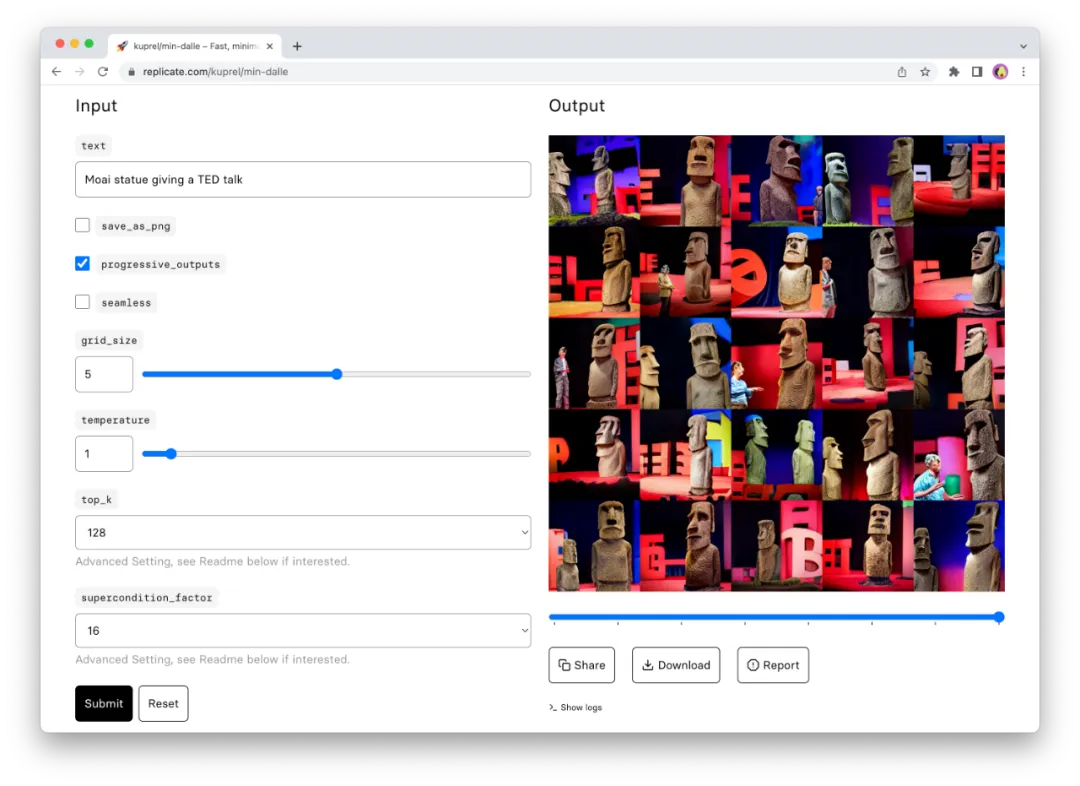Play with large models! One-click deployment with Replicate

Replicate is a cloud-based machine learning platform. It enables users to directly run machine learning models using cloud APIs, eliminating the need to understand complex machine learning model architectures.
In Python or Jupyter Notebook, allows users to run models and deploy and optimize models in the cloud. You can use it to run open source models published by others, or you can package and publish your own models. With Replicate, you can generate images, run and optimize open source models, and deploy custom models with just one line of code. By calling Replicate's API in Python code, you can run the model on Replicate and obtain the model's prediction results.
How model predictions work
Whenever you run a model, you are creating a model prediction. Model prediction is the process of using an established model to predict new data. In model prediction, we use an already trained model to predict the outcome of unknown data. This process can be completed by inputting new data into the model and getting the output of the model.
Some models run very fast and can return results within milliseconds. Other models take longer to run, especially generative models, such as models that generate images based on text prompts.
To check the status of predictions, you need to query the API and poll based on these patterns of long operation times. Pattern predictions can have various states.
- Start: Forecast is starting. If this state persists for more than a few seconds, it is usually because a new thread is being started to run the prediction.
- Processing: The model's predict() method is running.
- Success: The prediction was completed successfully.
- Failed: The prediction encountered an error during processing.
- canceled: The user canceled the prediction.
Once logged in, you can view a list of predictions on the dashboard with a summary of status, runtime, etc.:

How to run the model in the browser
You can run the model on Replicate using the cloud API or a web browser. The web page can directly display all inputs and generate a form, and the model can be run directly from the browser, as shown below:

How to use the API to run the model
Web pages are great for understanding models, but when you’re ready to deploy the model into a chatbot, website, or mobile app, APIs come into play.
Replicate’s HTTP API can be used with any programming language, and there are client libraries for Python, JavaScript and other languages to make the use of the API more convenient.
Using the Python client, you can create model predictions with just a few lines of code. First install the Python library:
pip install replicate
Authenticate by setting the token in the environment variable:
export REPLICATE_API_TOKEN=<paste-your-token-here></paste-your-token-here>
You can then run any open source model on Replicate from Python code. The following example runs stability-ai/stable-diffusion:
import replicateoutput = replicate.run("stability-ai/sdxl:39ed52f2a78e934b3ba6e2a89f5b1c712de7dfea535525255b1aa35c5565e08b",input={"prompt": "An astronaut riding a rainbow unicorn, cinematic, dramatic"})# ['https://replicate.delivery/pbxt/VJyWBjIYgqqCCBEhpkCqdevTgAJbl4fg62aO4o9A0x85CgNSA/out-0.png']
The above is the detailed content of Play with large models! One-click deployment with Replicate. For more information, please follow other related articles on the PHP Chinese website!

Hot AI Tools

Undresser.AI Undress
AI-powered app for creating realistic nude photos

AI Clothes Remover
Online AI tool for removing clothes from photos.

Undress AI Tool
Undress images for free

Clothoff.io
AI clothes remover

Video Face Swap
Swap faces in any video effortlessly with our completely free AI face swap tool!

Hot Article

Hot Tools

Notepad++7.3.1
Easy-to-use and free code editor

SublimeText3 Chinese version
Chinese version, very easy to use

Zend Studio 13.0.1
Powerful PHP integrated development environment

Dreamweaver CS6
Visual web development tools

SublimeText3 Mac version
God-level code editing software (SublimeText3)

Hot Topics
 PHP and Python: Different Paradigms Explained
Apr 18, 2025 am 12:26 AM
PHP and Python: Different Paradigms Explained
Apr 18, 2025 am 12:26 AM
PHP is mainly procedural programming, but also supports object-oriented programming (OOP); Python supports a variety of paradigms, including OOP, functional and procedural programming. PHP is suitable for web development, and Python is suitable for a variety of applications such as data analysis and machine learning.
 Choosing Between PHP and Python: A Guide
Apr 18, 2025 am 12:24 AM
Choosing Between PHP and Python: A Guide
Apr 18, 2025 am 12:24 AM
PHP is suitable for web development and rapid prototyping, and Python is suitable for data science and machine learning. 1.PHP is used for dynamic web development, with simple syntax and suitable for rapid development. 2. Python has concise syntax, is suitable for multiple fields, and has a strong library ecosystem.
 Python vs. JavaScript: The Learning Curve and Ease of Use
Apr 16, 2025 am 12:12 AM
Python vs. JavaScript: The Learning Curve and Ease of Use
Apr 16, 2025 am 12:12 AM
Python is more suitable for beginners, with a smooth learning curve and concise syntax; JavaScript is suitable for front-end development, with a steep learning curve and flexible syntax. 1. Python syntax is intuitive and suitable for data science and back-end development. 2. JavaScript is flexible and widely used in front-end and server-side programming.
 PHP and Python: A Deep Dive into Their History
Apr 18, 2025 am 12:25 AM
PHP and Python: A Deep Dive into Their History
Apr 18, 2025 am 12:25 AM
PHP originated in 1994 and was developed by RasmusLerdorf. It was originally used to track website visitors and gradually evolved into a server-side scripting language and was widely used in web development. Python was developed by Guidovan Rossum in the late 1980s and was first released in 1991. It emphasizes code readability and simplicity, and is suitable for scientific computing, data analysis and other fields.
 Can vs code run in Windows 8
Apr 15, 2025 pm 07:24 PM
Can vs code run in Windows 8
Apr 15, 2025 pm 07:24 PM
VS Code can run on Windows 8, but the experience may not be great. First make sure the system has been updated to the latest patch, then download the VS Code installation package that matches the system architecture and install it as prompted. After installation, be aware that some extensions may be incompatible with Windows 8 and need to look for alternative extensions or use newer Windows systems in a virtual machine. Install the necessary extensions to check whether they work properly. Although VS Code is feasible on Windows 8, it is recommended to upgrade to a newer Windows system for a better development experience and security.
 Can visual studio code be used in python
Apr 15, 2025 pm 08:18 PM
Can visual studio code be used in python
Apr 15, 2025 pm 08:18 PM
VS Code can be used to write Python and provides many features that make it an ideal tool for developing Python applications. It allows users to: install Python extensions to get functions such as code completion, syntax highlighting, and debugging. Use the debugger to track code step by step, find and fix errors. Integrate Git for version control. Use code formatting tools to maintain code consistency. Use the Linting tool to spot potential problems ahead of time.
 How to run python with notepad
Apr 16, 2025 pm 07:33 PM
How to run python with notepad
Apr 16, 2025 pm 07:33 PM
Running Python code in Notepad requires the Python executable and NppExec plug-in to be installed. After installing Python and adding PATH to it, configure the command "python" and the parameter "{CURRENT_DIRECTORY}{FILE_NAME}" in the NppExec plug-in to run Python code in Notepad through the shortcut key "F6".
 Is the vscode extension malicious?
Apr 15, 2025 pm 07:57 PM
Is the vscode extension malicious?
Apr 15, 2025 pm 07:57 PM
VS Code extensions pose malicious risks, such as hiding malicious code, exploiting vulnerabilities, and masturbating as legitimate extensions. Methods to identify malicious extensions include: checking publishers, reading comments, checking code, and installing with caution. Security measures also include: security awareness, good habits, regular updates and antivirus software.






